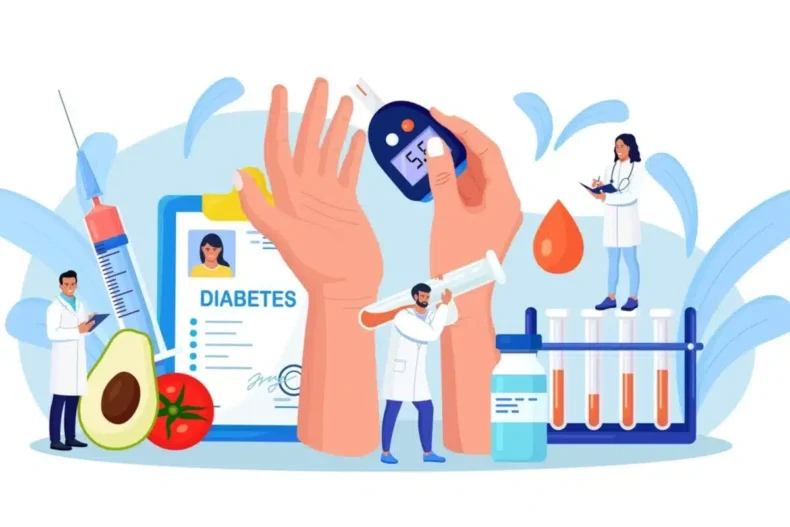Diabetes is a chronic (long-lasting) disease that affects your body’s use of blood sugar (glucose). Glucose is an essential source of energy for cells that helps make up tissues and muscles and is also the main fuel for the brain.
Our body breaks down food into sugar (glucose) and releases it into our bloodstream. When blood sugar goes up, it signals the pancreas to release insulin. Insulin acts as a key to letting blood sugar into your body’s cells to use as energy. Insulin is a hormone that helps glucose regulate in the blood.

When a person suffers from diabetes, their body cannot make enough insulin or can’t use it as well as it should be used. Diabetes can occur if the pancreas does not produce enough insulin or if the body cannot use the insulin effectively.
According to the data, In the year 2014, 8.5% of adults aged 18 years and older than that had diabetes. In 2019, 1.5 million deaths were directly caused by diabetes, and another 460000 Kidney disease deaths were caused by diabetes. 20% of cardiovascular death caused by blood sugar raised.
Hyperglycemia (high blood sugar) or high levels of insulin slowly begins to harm your body, many years before you’re diagnosed with diabetes. If you don’t treat it properly, it can hit your blood vessels, nerves, and organs. If you neglect it for a longer period, the complications get worse.
Diabetes can increase the risk of heart failure or stroke, and a person who has diabetes can also lose their vision. Diabetes could damage your kidneys, nerves, or other vital organs.

You can defend yourself by eating healthy food, getting daily exercise, taking medications, and getting regular checkups of your sugar level. These things can help you manage your blood sugar level, blood pressure, and cholesterol and can help you avoid serious harm.
Diabetes affects on Kidneys
Diabetes mellitus is a condition, that is one of the causes of kidney failure. High blood glucose or high blood sugar can damage millions of tiny filtering units (blood vessel clusters or glomeruli), which are present in your kidneys. The main function of the kidneys is to remove waste and extra fluid from the blood and return the clean blood to the body.

Kidney failure means your kidneys are no longer able to do their work to remove waste and extra fluid from the body. In this case, you’ll need dialysis or a kidney transplant.
Around 30% of people with diabetes develop kidney disease, also known as diabetic nephropathy. However, not all of these will progress to kidney failure.
There is no permanent cure for kidney disease, and the treatment is lifelong. The best way to delay diabetic nephropathy is to adopt a healthy lifestyle by managing your diabetes and hypertension ( high blood pressure).

Symptoms:
- Swelling of feet, ankles, eyes, or hands
- Fatigue
- Shortness of breath
- Increased need to urinate
- Loss of appetite
- Vomiting
- Nausea
- Worsening blood pressure control
Diabetes affects on Brain or nerves
Keeping Managing your blood sugar level is necessary to prevent heart disease, kidney disease, and vision loss, but did you know it can also affect your nerve cells or support cells in the nervous system? Our brains are so rich in nerves that they need more energy to function. The brain uses one-half of all the sugar (in energy form) in your body. But repeated episodes of low blood sugar can damage the brain.

Nerve damage, also known as neuropathy, happens to most people who have diabetes. If your blood sugar level is outside your normal range, it can imbalance your command center. Diabetes can cause more serious problems with learning and memory, mood shifts, hormonal changes, weight gain, and, over time, can cause Alzheimer’s.
Two types of blood sugar levels:-
- Hyperglycemia (high blood sugar level)- As you know, our brain relies on sugar, but “if you think the more sugar you give your brain, the better it will work,” then you need to know about hyperglycemia.High blood sugar damages the blood vessels that carry oxygenated (oxygen-rich) blood to the brain. When the brain receives a small amount of blood, the brain cells can die. This condition is called brain atrophy, can also cause problems with thinking ability and memory, and over time can lead to vascular dementia.

- Hypoglycemia (low blood sugar level)- It can happen when the blood sugar level dropped below 70mg/dL and it can be dangerous if left untreated. In this case, when our brain doesn’t get enough sugar, it shuts down the oxygen supply to the brain. Unlike hyperglycemia, which takes time to show its effects. In low sugar level cases, the signs are often immediate. Low sugar symptoms are feeling dizzy, shaky, trouble talking, and walking. Severe low blood sugar levels can even put you in a coma.
Since high and low blood sugar levels can cause damage, it is important to keep your blood sugar levels at target levels.

To prevent this kind of damage, people with diabetes have to adopt a healthy lifestyle, eat healthy foods, including green vegetables in their diet, do exercise and yoga, and take medications. If you are not feeling well or see any symptoms related to diabetes, consult your healthcare provider.
Read More: https://tdznkwjt9mxt6p1p8657.cleaver.live/type-2-diabetes-rises-for-under-40-in-uk/













